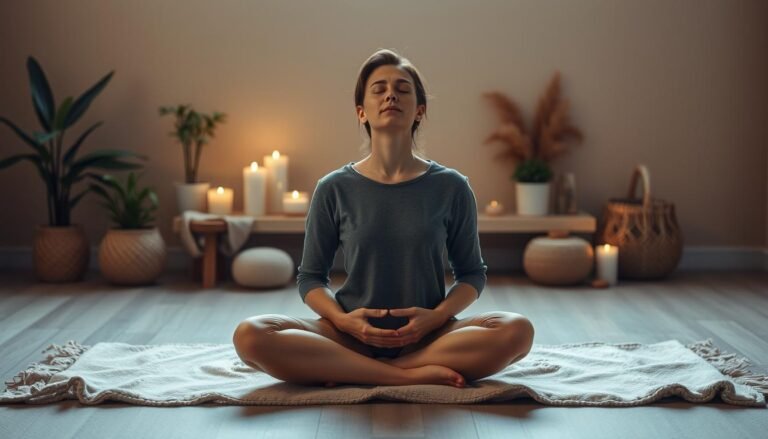From Insomnia to Empowerment: Reclaiming Sleep for Better Mental Health
Introduction
Imagine a world where restful nights and vibrant days are the norm—a world in which sleep does not elude you, but instead nourishes your mental health and empowers you to tackle daily challenges. For millions, however, this concept feels impossibly distant due to insomnia. This common disorder affects approximately 30% of adults worldwide, with far-reaching effects on their physical and mental well-being. In this comprehensive exploration, we will uncover how reclaiming sleep not only alleviates the pangs of insomnia but also serves as a powerful tool for enhancing mental health.
Through compelling case studies, practical tips, and valiant stories of transformation, this article seeks not just to inform but to inspire. Join us as we delve into the journey from insomnia to empowerment—reclaiming sleep for a future filled with vitality and mental resilience.
Understanding Insomnia: The Hidden Epidemic
What is Insomnia?
Insomnia is more than just having trouble falling asleep; it’s a persistent difficulty in sleeping that can manifest as trouble falling asleep, staying asleep, or waking up too early. According to the American Sleep Association, approximately 10% of adults experience chronic insomnia, which significantly impacts their day-to-day functioning.
Facts and Figures
| Statistic | Percentage |
|---|---|
| Adults suffering from insomnia | ~30% |
| Adults experiencing chronic insomnia | ~10% |
| Those acknowledging sleep issues | ~70% |
From this data, it is clear that insomnia is a pressing concern, with repercussions that extend into various aspects of life—be it cognitive, emotional, or physical.
The Connection Between Sleep and Mental Health
A growing body of research highlights the intricate relationship between sleep and mental health. Insomnia can lead to various mental health disorders, including anxiety, depression, and even psychosis. Conversely, those suffering from mental health issues often report disturbances in sleep.
Case Study: Sarah’s Journey
Sarah, a 32-year-old marketing executive, battled severe insomnia for over two years, which exacerbated her anxiety. She often found herself awake until dawn, her mind racing with work or personal concerns. Seeking help, Sarah discovered cognitive-behavioral therapy for insomnia (CBT-I), which allowed her to recognize and alter her thoughts associated with sleep. Within months, she transitioned from restless nights to restful slumbers, reclaiming her mental health in the process.
Analysis: Sarah’s journey showcases how understanding and addressing insomnia through therapeutic methods can lead to significant improvements in overall well-being.
The Science of Sleep
How Sleep Affects Our Brain
Sleep is a fundamental biological process that allows the brain to recover and rejuvenate. During various sleep stages—especially REM sleep—brain functions like memory consolidation, emotional regulation, and learning improvements occur. Disrupted sleep hampers these vital processes, leading to heightened emotional sensitivity, cognitive decline, and an increase in mental health disorders.
The Cycles of Sleep
Understanding sleep architecture provides insight into why sleep is so essential. Here’s a simple breakdown:
| Sleep Stage | Description |
|---|---|
| NREM Stage 1 | Light sleep; transition phase |
| NREM Stage 2 | Onset of true sleep; readiness to deeper |
| NREM Stage 3 | Deep sleep; physical restoration |
| REM Sleep | Dream phase; cognitive restoration |
By recognizing these stages, one can better appreciate the intricacies of sleep and the importance of ensuring that each stage is adequately achieved.
The Impact of Sleep Deprivation
The consequences of poor sleep extend far beyond just feeling tired. Chronic sleep deprivation can lead to:
- Impaired cognitive function
- Increased risk of chronic diseases
- Weakened immune response
- Heightened emotional disturbances
With such severe implications, finding ways to reclaim sleep becomes crucial for safeguarding mental health.
Strategies for Reclaiming Sleep
Establishing a Sleep Routine
Consistency is key when it comes to sleep. Establishing a sleep schedule that includes going to bed and waking up at the same time every day can reinforce your body’s natural circadian rhythms.
Tips for an Effective Sleep Routine:
- Limit Screen Time: Reduce exposure to screens at least one hour before bedtime, as blue light can disrupt melatonin production.
- Create a Restful Environment: Ensure your bedroom promotes sleep—keep it cool, dark, and quiet.
- Mindfulness and Relaxation Techniques: Engage in activities such as meditation, deep-breathing exercises, or reading before bed to calm the mind.
Sleep-Friendly Diet
What we eat directly affects our sleep quality. Certain foods can promote restorative sleep, while others can keep us tossing and turning.
Sleep-Inducing Foods:
- Tart Cherries: Known for their melatonin content.
- Almonds: Rich in magnesium which promotes sleep.
- Fatty Fish: Contains omega-3 fatty acids and vitamin D which help in sleep regulation.
Table: Foods to Enhance Sleep Quality
| Food | Benefits |
|---|---|
| Tart Cherries | Boosts melatonin levels |
| Almonds | Rich in magnesium |
| Fatty Fish | Omega-3 and vitamin D promote better sleep |
The Role of Exercise
Regular physical activity can significantly enhance sleep quality. Engaging in exercise during the day can help regulate your body’s sleep-wake cycle. However, timing is crucial; aim for morning or early afternoon workouts, as exercising too close to bedtime could be stimulating.
Cognitive Behavioral Therapy for Insomnia (CBT-I)
As evidenced by Sarah’s case, CBT-I is an effective treatment for insomnia. It helps tackle the thoughts and behaviors that contribute to sleep problems. Working with a trained professional, individuals can learn to challenge negative thought patterns and develop healthier sleep habits.
Empowerment Through Sleep: A New Outlook
The Transformational Power of Sleep
Reclaiming sleep is not just about kicking insomnia to the curb; it’s about embracing the full spectrum of life’s potential. The journey from insomnia to empowerment necessitates a multi-faceted approach—one that includes lifestyle modifications, psychological strategies, and supportive social networks.
Case Study: James’ Transformation
James, a freelance writer, struggled with insomnia due to an erratic work schedule. After discovering sleep hygiene principles and committing to a consistent routine, he transformed his life from one of fatigue and lack of focus to enhanced creativity and productivity. His experience underscores the power of structured sleep in reaping mental health benefits.
Analysis: James’ successful adaptation showcases how structured change can foster empowerment and creativity.
Building a Supportive Environment
Creating a sleep-positive culture in your home can inspire everyone to prioritize sleep. Communicate openly with loved ones about the importance of sleep, encourage shared bedtime routines, and support one another’s efforts to improve sleep hygiene.
Conclusion: A Journey Worth Taking
As we conclude this exploration of "From Insomnia to Empowerment: Reclaiming Sleep for Better Mental Health," it becomes clear that taking back control over your sleep is a powerful act of self-love. The journey may require effort and patience, but the rewards—improved mental health, enhanced focus, and emotional balance—are undoubtedly worth the endeavor.
Think of sleep as your foundation—the robust base upon which resilience, creativity, and fulfillment can flourish. As you embark on this transformative adventure, remember that empowerment is not just a destination; it is an ongoing process of self-discovery, growth, and renewal.
FAQs
1. What is the best sleep duration for adults?
Most adults require 7-9 hours of sleep per night for optimal health and functioning.
2. Are sleep medications effective for insomnia?
While sleep medications can provide short-term relief, they are not a long-term solution. Behavioral approaches like CBT-I are generally recommended.
3. How can lifestyle changes improve sleep?
Regular exercise, a healthy diet, and consistent sleep schedules contribute significantly to improved sleep quality.
4. Can insomnia be cured?
While some individuals may fully overcome insomnia, many find ongoing management strategies essential for maintaining good sleep hygiene.
5. What should I do if I can’t sleep?
If you find yourself unable to sleep, get up and engage in a quiet, relaxing activity until you feel drowsy again, avoiding screens and stimulating activities.
In your journey from insomnia to empowerment, remember: sleep is not just a luxury; it is a vital element of your mental health and overall well-being. Embrace the power of sleep, and you may find your world illuminated in ways you never thought possible.















